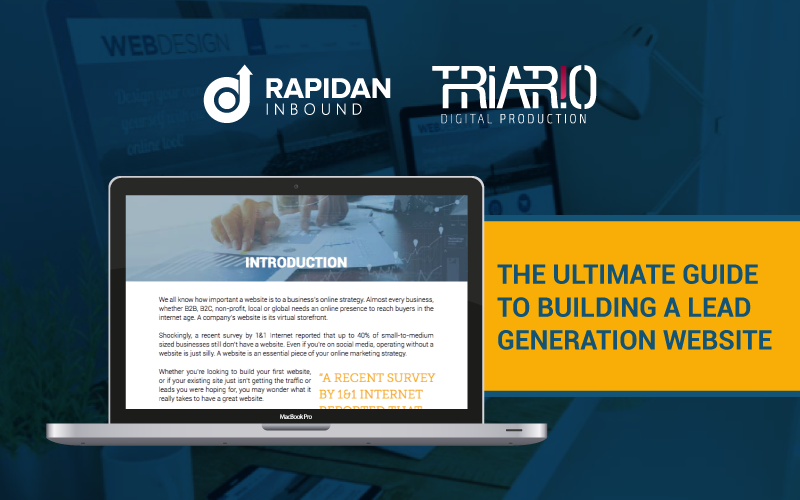
It seems self-explanatory that a killer website is the foundation of a successful inbound marketing program. After all, inbound marketing is the art of attracting buyers to your website, converting them to leads and eventually to delighted customers. But we see websites all the time that sabotage their owner's inbound marketing efforts. Poor user experience design and dated branding hinder their inbound marketing efforts.
So let's go a bit deeper into why you should invest in a killer website to be the foundation of an inbound marketing program that gets results.
Your website is a 21st century storefront
It's settled knowledge that your website is the first place buyers go when they begin their purchase process. It's hard enough to get buyers to find you - it's a shame to scare them away with an unprofessional website when they find you.
Here are three concepts to keep in mind when building a website to serve buyers:
- Your website should be consistent with your content. For example, if you provide cutting-edge cybersecurity technology and are creating great educational content, your website should enhance the reputation your great content is creating. If somebody finds a piece of content on Google, clicks through and finds a website that hasn't been updated since 2005, your shooting yourself in the foot.
- Your website should be designed for your target buyers, not you. Too many websites are self-focused rather than focused on buyers. While trust elements like client logos and certifications are important, they should be used to support your buyer-focused content.
- Your website should make it easy for customers and prospects to find what they want. A good user experience is based on simplicity, using concepts like whitespace, contrast and ease of navigation to serve your audience. We follow the maxim expressed by DaVinci: "Simplicity is the ultimate sophistication."
An unprofessional website lets your sales team down
Picture this scenario: your best sales professional meets a prospect at a networking event. They have a great conversation, your sales professional demonstrates an understanding of the prospect's industry and the prospect agrees to meet with her. It turns out the prospect has a real opportunity that you can help with. They exchange cards and set a date to have lunch. Later that day, the prospect goes to your website and sees a dated website that doesn't convey the true expertise and value of your business.
All that work your sales professional did developing the opportunity is wasted. So here are some things to keep in mind to support your brand and your team with your website.
- All websites have a shelf life - keep your site up to date. The reality is that if your website is more than three years old, you probably need a redesign. Both design and content need to be updated frequently. Even if you don't do a complete redesign, you can update the look, feel and content of your website, particularly if you're using a user-friendly content management system like WordPress or HubSpot.
- Your company page is your organizational business card. For most websites, the company (about) page is where potential buyers go after viewing your homepage. It should look professional and portray the "personality" of your business. Provide information about key team members and satisfied customers. This is your opportunity to develop a more intimate relationship with potential buyers.
- Use the same language on your website that your team uses with customers. For example, we are HubSpot Certified Partners and we describe what we do as inbound marketing. You won't see terms on our site like digital marketing, internet marketing or web marketing. When we talk to people, we also use the term inbound marketing.
Content is king and your website is how you deliver content
When buyers do pre-purchase research on the web, they often land on your blog to read a post that matches the intent of their search. If they like what they ready, they will click on your homepage and company page to learn more about your firm. Think of your website as your iTunes store, where buyers go to get the content they need to educate themselves and move through their buying processes.
Here are some thoughts to consider to support your content marketing efforts.
- Build your website to support your inbound marketing. Many businesses start inbound marketing on their existing websites. In most cases, this will limit your chances for success. If you're investing in inbound marketing, you should invest in a website that is built to support it.
- Make sure your website supports lead conversion. While inbound marketing is used to educate buyers and customers, you want to do more than just educate. You want to generate leads and sales. Include lead generation opportunities in blog posts and other website pages. Use lead conversion best practices to optimize your results.
- Make sure your website is up-to-snuff technically. This is critically important - research shows that if your page doesn't load within 3 seconds, most buyers will bounce somewhere else. Don't waste all the effort and resources you've expended to create great content that attracts buyers to your site just to have them bounce before they ever see it.
Here's a suggestion - ask someone you trust to truthfully tell you what they think about your website. Ask them to do the blink test on your homepage. Close your eyes, open them and see if they can understand what you do within 5 seconds. Or better yet, schedule a free website consultation with us. We'll give you tips on how you can improve as well as a technical evaluation of your site.
But whatever you do, know that your website is the most important keystone of your inbound marketing strategy.







